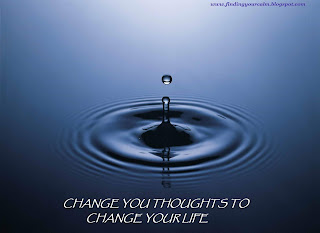Do you wish you could think differently about yourself?
Are you aware of the things you do say to yourself?
It took me a long time to understand that all the negative emotions I experienced came from inside me, from my own internal dialogue, and it was up to me to change them. To do that, I had to catch myself thinking the negative thoughts and interrupt them. But before that I had to become aware of what they were.
“You live with your thoughts so be careful what they are.”- Eva
Arrington
- They could be beating themselves up about something they have done that they are not happy about;
- They could be imagining a scenario where they are arguing with someone, or speaking their mind to someone who has upset them;
- They could be going over something that they had done that they are ashamed of, or that didn’t work out as they wanted it to - reliving the bad feelings over and over again;
- They could be imagining things going wrong, or disasters happening;
- They could just be saying negative things to themselves, about themselves.
- Take a pen and paper and look at yourself in the mirror
- Write down all the things we see and think about yourself while looking at yourself
- Then read through this list afterwards
Are there negative things in there, even insulting things?
If so, ask yourself: if a stranger (or even a friend) said those things to you, how would it make you feel? Would you be offended? Hurt? Insulted?
If your answer is yes, ask yourself why you are saying those things to yourself, why you want to hurt yourself, why you aren’t being kind to yourself.
"Take care how you are talking to yourself, because you are listening." - Lisa M Hayes
People talk about ‘liking’ or ‘loving yourself’, the process above is one of the ways to find out if you actually do.
We can go further and make a list of all the things we do and don’t like about ourselves. But then we need to decide, am I being fair, or am I being hard on myself? And the crucial question: Is this my own opinion, or is it something someone has said about me?
Often the things we say to ourselves have come from external sources - parents, friends, teachers, even work colleagues. We need to ask ourselves how accurate they are, and while we're at it, ask: Why is someone else’s opinion of me more important than my own?
“Be true to yourself. You will stop caring what other people think about you when you realise how rarely they actually do it.”
In many self-help and personal development books and articles, they say we should not seek outside approval about who we are, or who we want to be, that we should be ‘self-approved’. But it can be hard to start being approving of ourselves if we are in a mindset where we are not happy with ourselves.
But being happy with ourselves is directly related to the dialogue we use when we converse with ourselves.
How we speak to ourselves in turn affects how we react to the world outside. It alters our perception on the things people say and do around us.
If we feel bad about ourselves and our reaction is negative, then often the response from the outside world will be negative in return, and this will then only reinforce the negative internal dialogue we use when thinking about ourselves.
"The energy you put out is the energy you get back." - Rachael Bermingham
Once I started to think about the things I was saying to myself, I realised how unkind I was being to myself. I understood that I was using labels that others had put on me. I was particularly bad for doing negative scenarios involving other people who had upset me at some time. I would imagine telling them what I really thought, but as I would then imagine them giving a negative reaction, I would only upset myself further.
To break this way of thinking I started a process each time:
- I would recognise that I was doing it;
- I would shout ‘STOP!’ inside my head (sometimes out loud if I was alone);
- I would tell myself that it served no purpose, that in fact I was persecuting myself;
- I would ask myself what it was really about, what had upset me in the external world at that moment;
- I would then argue against the negative dialogue, sticking up for myself and reassuring myself.
“When patterns are broken, new worlds emerge.” - Tuli Kupferberg
But this is just one step in the cycle of breaking the negative thought, one that needs repeating on a daily basis. Negative emotions surface in lots of ways and through different situations.


No comments :
Post a Comment